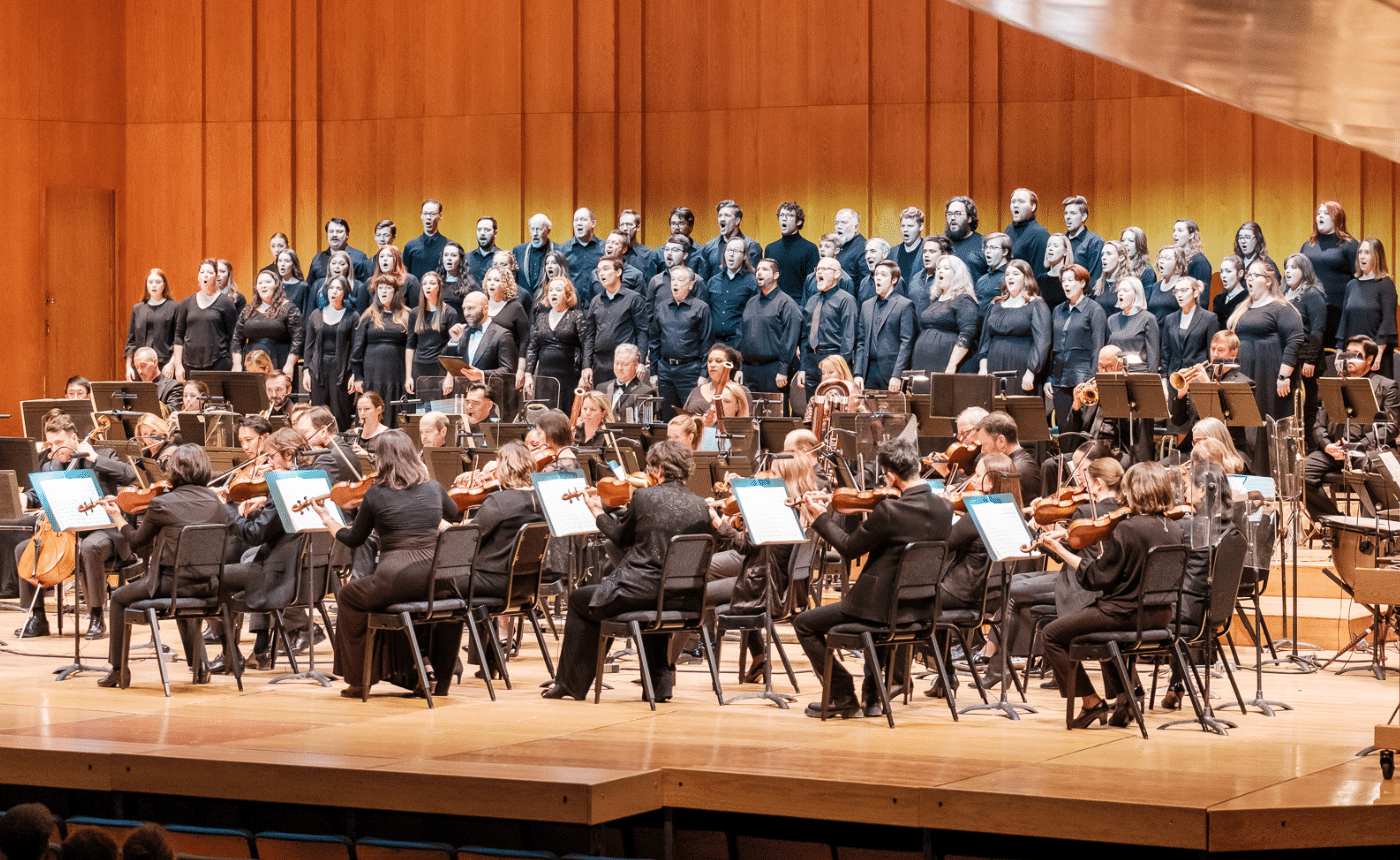10 Trailblazing Women in Classical Music
by Kathleen Sykes and Carol Anderson
(Updated February 2023)
Typically when people think of classical music, they envision composers like Mozart, Schumann, and Mendelssohn. But far too often, their female counterparts are overlooked. Female composers like Nannerl, Clara, and Fanny were just as talented (if not more!) To help familiarize you with some of these fabulously talented ladies, we made a list with some recommended listening. And we’re sure you’ll find a new favorite composer from it!
When we started this list, we had over 20 composers and probably could have added three times more. For the sake of length, we narrowed it down to 10 famous women in classical music who changed the course of musical history and paved the way for current female composers.
Without further ado, here’s our list of amazing female composers:
Hildegard of Bingen (1098 – 1179)
Hildegard of Bingen was the OG of European music. This nun was a force to be reckoned with—besides being a composer, she was also a polymath, philosopher, visionary, and historian. She is even considered a saint in several Christian religions.
Her music is heavenly. She composed for the human voice, but we particularly like this recording of O Virtus Sapientiae as performed by the Kronos String Quartet.
Barbara Strozzi (1619-1677)
Venetian composer Barbara Strozzi was a woman ahead of her time. Forward-thinking entrepreneur, prolific composer, and single mother (by choice) to four children, this illegitimate daughter of poet Giulio Strozzi grew up surrounded by liberal intellectuals. She was celebrated in Venetian society as an excellent lutenist and a gifted soprano. As a composer, Barbara also broke new ground as the first woman to publish her music under her name instead of using a male pseudonym. Listen to this rendition of her lament “Che si può fare,” from 1664.
Marianna Martines (1744 – 1812)
Once upon a time, a young woman named Marianna lived with her family in a beautiful plaza in Vienna. Among her neighbors were a noted singing and composition teacher and a starving musician named Joseph Haydn. As a girl, a family friend noticed her precocious nature and arranged for her to have an education far exceeding the standard for women of her social class. The talented prodigy performed in front of the imperial court and played with Mozart occasionally, and her compositional work was well-known throughout Europe—no big deal.
Our heroine in this story was very well-connected, and she ultimately excelled in music. Although she never had the opportunity to seek an appointed position due to the cultural norms surrounding women at the time, nonetheless, her music rivals any of her contemporaries. We particularly like her “Overture (“Sinfonia”) in C Major”.
Fanny Mendelssohn (1805 – 1847)
When you think of the composer Mendelssohn, many people will think of Felix, but his sister Fanny was an incredible composer and musician in her own right. This brother/sister team made quite the dynamic duo—they supported and influenced each other throughout their lives and remained very close.
When it was difficult for women to publish their work, her brother offered to publish her work under his name, and in return, she gave critical feedback on his work. This led to a rather embarrassing episode when Queen Victoria received Felix at Buckingham Palace and told him she would sing one of her favorites of his songs—which he admitted was actually by Fanny. Siblings, amiright?
Clara Wieck Schumann (1819-1896)
For years, Clara Wieck Schumann was known only as Robert Schumann’s wife, but she was an extraordinary composer and pianist in her own right. Were it not for Clara’s pianistic gifts, Robert Schumann might never have pursued a musical career. After hearing her perform at a house concert, he pleaded with his mother to let him quit law school and study music instead. As a performer, Clara revolutionized the programming of piano solo recitals. She was one of the first classical pianists to memorize music for performance. She was also the main breadwinner for the Schumann family during her marriage to Robert and many years after his early death.
The Piano Trio in g minor, Op. 17, was completed while Clara and Robert were residing on the North Sea island of Norderney, hoping the sea air would improve Robert’s health. The trio shows that not only could Clara write brilliantly for the piano, but she also understood the capabilities of the violin and cello and showed these instruments off beautifully. As a pianist (Carol), I’m dying to get my hands on this great work!
Guadalupe Olmedo (1853 – 1889)
Guadalupe Olmedo was a talented pianist, but she soon discovered composition and wrote and presented various works while she studied at the Conservatorio Nacional de Música in Mexico. Her work was well received and earned her a medal with the inscription: “To miss Guadalupe Olmedo, the first female Mexican composer who wrote in the classic genre.”
You can see how it deserves your attention when you listen to her music! Its lush Romantic melodies are dreamy.
For example, listen to this solo piano piece:
Ethel Smyth (1858-1944)
As we celebrate the passage of the 19th amendment, it’s only fitting to mention Ethel Smyth (1858-1944), the English composer and suffragist. Her 1911 composition “The March of the Women” became an anthem of the Suffrage Movement. One notable rendition occurred in a prison filled with activists, where the women marched around the courtyard singing while Smyth conducted boisterously with a toothbrush.
Some criticized Ethel for writing music that was too “masculine,” but when she wrote something more nuanced and delicate, she was brushed off as just a “lady composer.” Talk about a “lose-lose” situation! Despite the mixed commentary, she was honored as a “Dame” of the British Empire in 1922. In 1890, Serenade in D was Smyth’s first major orchestral work, establishing her as a legitimate voice in English music.
Amy Beach (1867-1944)
Like Clara Schumann, Amy Marcy Cheney Beach (1867-1944) was a child prodigy at the piano. She is the first American woman to gain recognition as a composer. She studied with an American teacher only briefly and was otherwise self-taught—this was notable at a time when composers of any nationality typically spent some time in Europe to learn their craft.
During her marriage to a doctor several decades her senior, Amy agreed only to perform two times a year and to refrain from teaching piano lessons, instead functioning as a “society matron and patron of the arts.” Composition became her main outlet during this period, with her 1896 Mass in E flat Major favorably compared to the great works of Bach and Cherubini. After her husband’s death, Amy returned to concertizing, touring in the fall/winter, and composing the rest of the year. She even performed in Salt Lake City in the fall of 1915! One of her closest friends was opera singer Marcella Craft, who often performed her songs, including her most well-known, “The Year’s at the Spring,” here performed by soprano Deborah Voigt.
Florence Price (1887 – 1953)
Florence Price was a pioneering force in American music! She overcame tough odds and became the first African-American woman to be recognized as a symphonic composer AND, in 1933, whose work was played by a major orchestra. Remember, this was during the Jim Crow era and well before the first black person, Marian Anderson, sang on the stage of the Metropolitan Opera in 1955. Throughout her life, she forged friendships with giants on the American art scene like Langston Hughes and Anderson, as mentioned above, who aided her success in the music world.
She was a prolific composer and wrote somewhere over 300 works (many of which weren’t discovered until years after she died), so it’s hard to pick favorites! However, her Symphony No. 3 in C minor is well worth a listen:
The Sisters Boulanger (Nadia: 1887 – 1979 and Lili: 1893 – 1918)
It’s hard to mention one Boulanger sister’s impact on the musical world without mentioning the other. Nadia and Lili were born into a musical family, and while they each had a different focus, the classical music world still bares their incredible legacy. Throughout her tragically short life, Lili had an immense talent for composition and was the first woman to win the prestigious Prix de Rome. Nadia, on the other hand, was a gifted teacher who influenced musical superstars like Aaron Copland, Philip Glass, and Quincy Jones (in addition to dabbling in composition herself.)
Lili’s D’un matin de Printemps is filled with shimmering colors and textures and is one of the last pieces she ever wrote:
Check out our upcoming symphony schedule to hear classical music composed by incredible women and much more!











